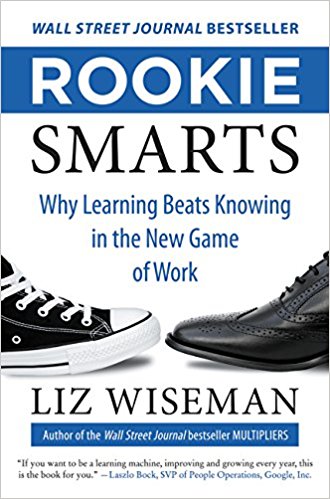Rookie Smarts Summary
6 min read ⌚

Why Learning Beats Knowing in the New Game of Work
Remember your first day at work? The trembling, the fear of making a mistake, the attentiveness. Remember how many days you stayed up afterhours to perfect some skill?
Now, where did it all disappear?
Liz Wiseman is – sorry for the pun! – a very wise woman. And she might just have the answer to that question. And few more you haven’t even asked yourself.
Join us in reading her influential “Rookie Smarts”.
We have the best bits.
Who Should Read “Rookie Smarts”? And Why?
Liz Wiseman knows about leadership quite as much as anyone on this planet. After all, you don’t get into the Thinkers50 ranking list for nothing three times in a row! With this in mind, the very title of this book begs the question: why would Wiseman show any interest in rookie smarts then? Is she conspiring some paradigm shift?
The short answer is: she is. And whether you are a manager or a leadership trainer, you’ll want to find out what it is. But, unlike “Multipliers,” this book is also about beginners. And how they can use their enthusiasm to become leaders.
About Liz Wiseman
 Liz Wiseman is an American researcher and executive advisor, and the president of the world-famous Wiseman Group.
Liz Wiseman is an American researcher and executive advisor, and the president of the world-famous Wiseman Group.
In addition to “Rookie Smarts,” she has authored two more well-received books, “The Multiplier Effect,” and the New York Times bestseller “Multipliers.”
“Rookie Smarts Summary”
Even by glancing in its content, you can tell what “Rookie Smarts” is about. That’s because it is a book neatly divided in two parts.
The more interesting, five-chaptered first one, titled “Rookie Smarts: Living on the Learning Curve” describes the benefits of the oft-dismissed rookie smarts and classifies them into four categories.
The second part, titled “Cultivating Rookie Smarts”, consists of three chapters which call for rookie revival and lay out the ways to do it.
Right away, Wiseman points to few studies which suggest that the rookie-expert (or in her word: veteran) dichotomy is obsolete and should be cast aside. Because both rookies and veterans have their good and their bad sides. And because the best companies are those which have learned to use them all.
Needless to say, veterans are able to find simpler solutions in a much shorter period of time. Their experience has given them this prerogative. However, they are neither as innovative, nor as open to new ideas as rookies. They are simply profoundly sure they’ve seen it all.
But, they haven’t!
And just as rookies have so much to learn from them, they can learn from rookies too.
Wiseman speaks of four different rookie-smart modes, describing each of them and contrasting them to the analogous veteran states. We’ll do the same. Though, in not so many words.
1, Backpackers vs. Caretakers
Backpackers have “unencumbered minds.” They are those familiar “rookies times two”: they know practically nothing. They enter a field without preconceived notions and expectations. As a consequence, they know boundaries and are unconsciously ready to break them. They are mentally prepared for changes.
Caretaker veterans, on the other hand, don’t believe them and won’t try anything new. They are gatekeepers: they know the tradition and follow it blindly. They are not open to new opportunities. And they are flabbergasted when they are left behind.
This happened when a backpacker, a newcomer and junior doctor Roger Bannister became the first 4-minute miler in 1954. The caretakers of his time didn’t believe that running a mile under 4 minutes was possible. So, they never even tried.
Your way out, veteran reader?
Ask naïve questions. Get a fresh start. Release your resources.
2. Hunter-Gatherers vs. Local Guides
When rookies enter a new terrain, they have to learn how to survive there. Just like our ancient ancestors. So, they are prone to acquire new knowledge from everything and everywhere. They filter nothing – they soak up the new information.
Their veteran counterparts?
Local guides suffer from “geo-blivion.” They’ve done these things thousands of times before, and they know the area like the back of their palms.
So, veterans simply stop being aware of their surroundings and environment. Once again, they do things blindly and correctly, because they know seven or eight habits which can guarantee them success.
But, environments change. Their habits don’t.
What should they do differently?
Swap a job with a rookie. Or ask junior colleagues to mentor them. Start remapping their terrains.
3. Firewalkers vs. Marathoners
Firewalkers move cautiously, but quickly. They try to master what they’ve just started doing and, consequently, they ask for continual feedback. They want to close the gap with the experts as soon as possible. So, they split their running course into many checkpoints.
Marathoners know that it’s about the long run. But, they rely so much on their record of accomplishments that they forget to readapt. They don’t calibrate their performance anymore. Keeping the steady pace is usually good. But, be prepared to be surprised by the newcomer.
Unless –
Unless you get your hands dirty. Risk as you’ve risked in the beginning. It’s time to move from that comfortable chair of yours and get into some action!
4. Pioneers vs. Settlers
Rookies are pioneers. They’ve just entered a new territory and they are forging ahead. They may encounter something scary, but the wilderness may hide something much more beautiful as well. It’s the second thing that leads them.
Veterans are settlers. They know the place, and they are satisfied with what they have. They won’t leave the comfort zone unless they know there’s something better out there.
The thing is: they should!
Don’t fall behind! Take up a new discipline and feel as a rookie once again. Become a half-expert in some other field.
After all, you know full well what Einstein says:
“Once you stop learning, you start dying.”
Key Lessons from “Rookie Smarts”
1. Veteran Mode Off: Caretakers, Local Guides, Marathoners, Settlers
2. Rookie Smarts Mode On: Backpacker, Hunter-Gatherers, Firewalkers, Pioneers
3. The Rookie-Smarts Organization
Veteran Mode Off: Caretakers, Local Guides, Marathoners, Settlers
If you’ve worked in an organization for some time, you’re probably a veteran. And your mind is usually in one of these four modes.
You’re either a caretaker, because you know the boundaries, or a local guide, because you know the environment perfectly; you’re either a marathoner, because you’re inert and know that small steps will get you to the end, or settler, because you’ve had enough with exploring.
It’s time this stopped!
You’ve climbed your career ladder.
But, keep doing this and you’ll fall of the learning curve.
Rookie Smarts Mode On: Backpacker, Hunter-Gatherers, Firewalkers, Pioneers
If you’re just starting to work somewhere, you might be afraid of being a beginner. Don’t worry: Wiseman says that there’s plenty veterans can learn from you.
You may be a backpacker, but that means you’re more adventurous than them. You may be a hunter-gatherer, but you are also hyperaware and soaking up knowledge. Veterans are long past it – to their detriment.
What if you’re a firewalker? Don’t worry: asking continual feedback is good for everybody. And pioneer? Improvisation always makes up for lack of knowledge.
The Rookie-Smarts Organization
To all the veterans out there: rookie-smart modes are what got you to where you are. It’s also what will get the next expert to your positions.
You want to stop that?
Well, make a trick or two. Pair rookies and veterans. Swap jobs with newcomers. Ask for feedbacks from those below you. Become half-expert in something you know nothing about.
Trade boredom with newfound joy.
Don’t be conventional. It’s the non-conformists who move the world.
Like this summary? We’d Like to invite you to download our free 12 min app, for more amazing summaries and audiobooks.
“Rookie Smarts” Quotes
This book is about living and working perpetually on a learning curve. Share on X Wise leaders leverage the rookie smarts on their team… because of the value rookies bring to the table: new practices, expert networks, agility, tireless improvisation, and a greater sense of ownership. Share on X As companies mature and grow, many become caught in the trappings of success and lose their rookie smarts—the twin powers of naïveté and chutzpah that germinated their initial success. Share on X Rookie smarts is not the exclusive domain of the young, the inexperienced, or the naïve. Even the most experienced and successful professionals can renew themselves and find their rookie groove again. Share on X Every revival begins with an awakening, an increased level of focus and awareness Share on XOur Critical Review
“Rookie Smarts” attempts to do two things: to inspire leaders regain back their creativity and curiosity from when they had been rookies, and help rookies find the category they currently belong in and the class they would like to fit in the future.
As expected when written by someone with her background, the book does well on both accounts. Sometimes it’s repetitive, and sometimes the writing appears a bit shoddy, but the overall impression is that “Rookie Smarts” can change the way you think about yourself and your position in your company.
And it’s not like you can ask for more from a book.
Emir is the Head of Marketing at 12min. In his spare time, he loves to meditate and play soccer.







